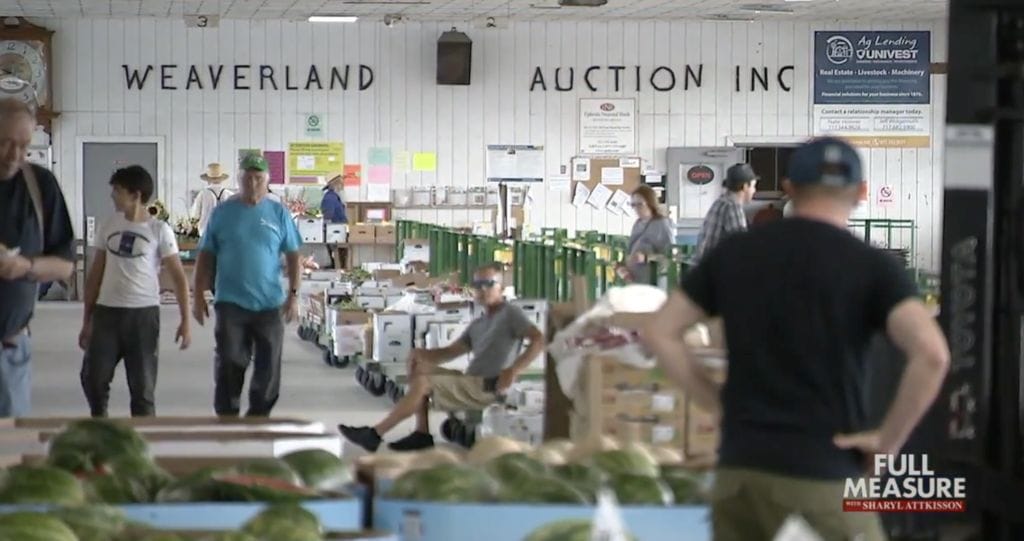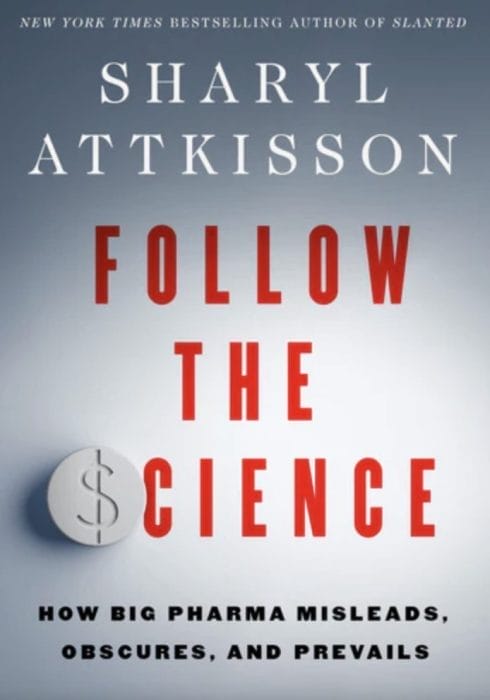Today we end with a colorful glimpse inside a staple of Amish and Mennonite life, which we learned a little bit about on a recent visit: auctions. They’re always going on. They’re used as community events to sell products, real estate, and raise big money for charitable causes. Here is our look at a little-seen phenomenon we were invited to observe in the “Plain” community of Lancaster County, Pennsylvania.
For more than two decades, Bruce Eberly has been operating this produce auction in Lancaster County, Pennsylvania, deep in the heart of Amish and Mennonite country.
Bruce Eberly: The auction itself has like 50 shareholders, so they do make some money. They do it mainly to have a place for the local farmers to have a place to sell their produce.
Sharyl: Is auctioneering just generally a big part of the culture here?
Bruce Eberly: Yes, I would say it’s a big part, because if they’re going to sell their property, they would use an auctioneer rather than just listed for like a real estate agent.
Bob Herr is here today to buy vegetables and fruit for his produce markets in New York and Pennsylvania.
Bob Herr: It’s a big auctioning community. I’m actually an auctioneer. I don’t practice a lot. But there’s a lot of auctions here of produce, but also real estate, antiques, farm equipment. It’s a big business around here.
Sharyl: What’d you bid on today and what’d you get?
Bob Herr: So far, it’s only been the bins. So, I bought white corn, bicolor corn, cantaloupes, Canary melons — the bright yellow ones there — seedless watermelons, and seeded watermelons.
Sharyl: What’s good about the auction versus a different way of buying?
Bob Herr: The quantity is here, the variety is here, and it really makes growers better because quality produce brings more money. So, like tomatoes, there’s a couple sellers of tomatoes. They’ll bring $10 a box more than everybody else because everybody knows that they’re a premium grower. If it’s a bad grower with wormy corn or short ears or something like that, nobody’s going to buy it.
Besides produce and real estate, they auction an impressive array of flowers and plants.
One of the biggest drivers of auctions here is charitable causes. They raise millions. Everybody is expected to bring something and buy something. The turnout is impressive, the generosity remarkable. At this auction to raise funds for a local woman with cancer, they ended up with an estimated $200,000.
Bob Herr: There’s so many different ones. This Weaver Land, where we are right now, they do a big one for a local fire department that’s all volunteers, and people are very generous in what they donate to sell. And also in their bidding, people will pay more. Leola Auction has a really big one for special needs children in the Amish community. The local hospice auction that goes on for two days that raises big, big money.
Sharyl Attkisson: One thing I noticed at the charity auction, people were bidding much more than —
Bob Herr: Oh yeah, absolutely. Yeah.
Sharyl Attkisson: — what something was worth.
Bob Herr: People around here are very generous, very giving. I mean, for example, the last church missions auction I did with a very small church — well, I don’t know, it might be a couple hundred members — but everybody turned out. The first tomatoes of the year, like a little box, I was selling them for like $50. Anything, you name it. I mean, especially if it’s something that somebody made themselves. I’ve even seen families that will see something and just bid it up like two people in the same family just to push the price up. But, it’s a nicer way than just flat-out donating — there’s a lot of that too.
Bruce Eberly: They’re very community-oriented to help each other out if the needs arise. Very conscientious, and God is a big part of their life.
Watch story here.




The farmland is being threatened. Between huge warehouses going up on farm land and people leaving New York City and New jersey to the rural areas of Lancaster County where suburban type building is growing to meet their needs. Another threat is ESG. Farmers are independent people. Due to the climate change fad the loaning banks are requiring farmers to produce only green no meat and low carbon emitting production; they will be unable to get loans.
A big cost also is the price of fertilizer is becoming prohibitive. Another big cash crop the Amish grow is tobacco for cigar wrappers. That’s becoming a no no as the years go by.